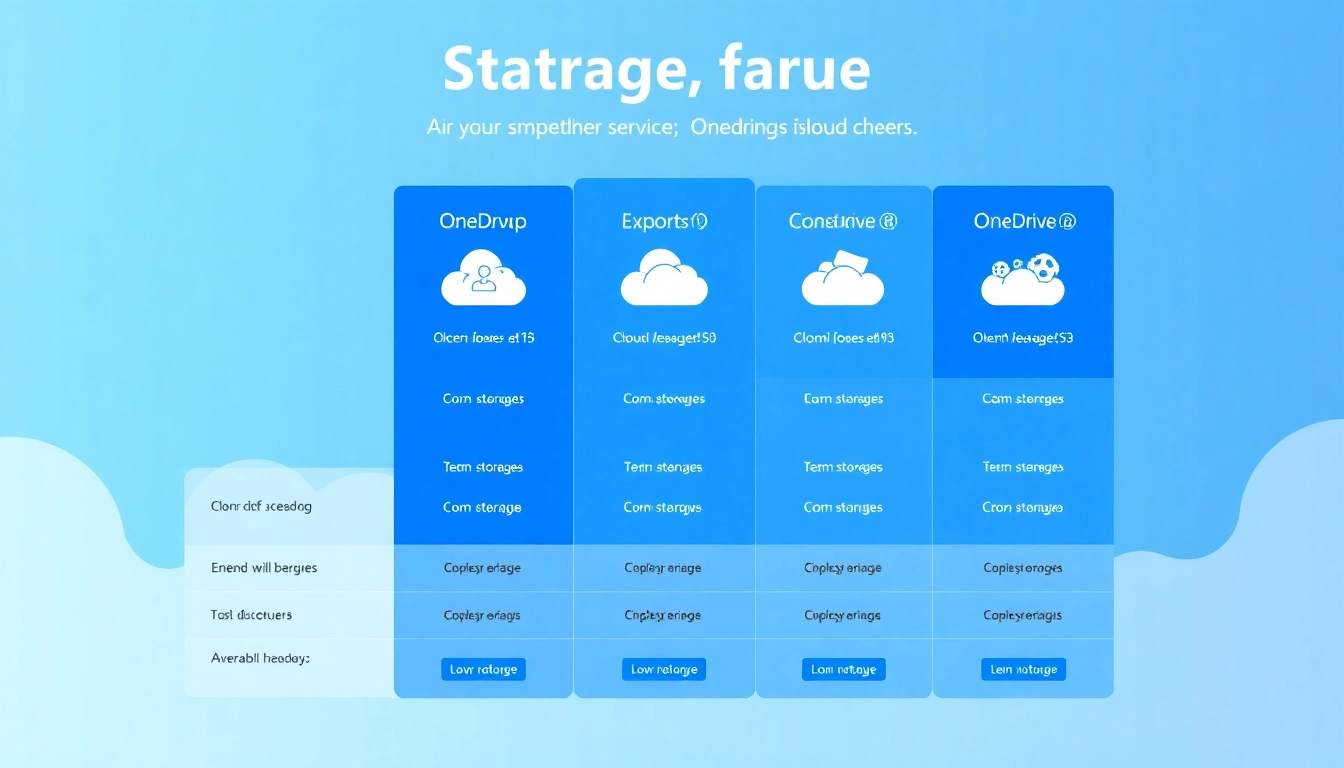Introduction to OneDrive Pricing
With the rise of digital data storage needs, cloud storage solutions like Microsoft OneDrive have gained immense popularity. As individuals and businesses pivot towards remote work and reliance on digital archives, understanding the OneDrive cost becomes crucial. This guide explores the pricing structures, features, and considerations involved in choosing the right OneDrive plan for your needs.
What is OneDrive?
OneDrive is a cloud storage service provided by Microsoft that enables users to store, share, and synchronize files across multiple devices seamlessly. Integrated within the Microsoft 365 ecosystem (formerly known as Office 365), OneDrive allows users to manage their documents, photos, and videos with ease. It stands out for its robust collaboration features, which are particularly useful for teams needing to access and co-edit files in real-time.
Why Consider OneDrive for Cloud Storage?
Beyond its basic storage capabilities, OneDrive offers various advantages, including:
- Integration with Microsoft Services: Being part of the Microsoft ecosystem, it integrates well with other products like Word, Excel, PowerPoint, and Teams.
- Cross-Platform Support: OneDrive is compatible with various operating systems, including Windows, macOS, Android, and iOS, allowing for easy access to files from virtually anywhere.
- Generous Free Storage Options: New users receive a starter plan with free storage, helping them to test the service before committing to a paid plan.
- Advanced Sharing Features: Share files and folders easily with customizable permissions and options for control over file access.
Overview of OneDrive Cost Structures
OneDrive offers a range of pricing structures that cater to different needs. The costs evolve based on the storage requirements—ranging from free storage plans to subscription models. Understanding these plans will help users evaluate what aligns best according to their requirements and budget.
Comparing OneDrive Plans
Free vs. Paid Plans: What You Need to Know
OneDrive provides an enticing free initial offer that includes 5 GB of cloud storage. This is suitable for casual users who need a small space for document storage. However, as user needs grow, upgrading to a paid plan becomes essential. The paid plans not only offer more storage but also include additional features such as advanced sharing options and enhanced security protocols.
Detailed Breakdown of OneDrive Cost Tiers
Here’s a detailed breakdown of the current OneDrive cost tiers:
- Free Plan: 5 GB of storage at no cost.
- OneDrive Standalone:
- 100 GB for $1.99/month.
- Microsoft 365 Personal:
- 1 TB (1,000 GB) for $6.99/month or $69.99/year.
- Includes access to Microsoft 365 apps such as Word and Excel.
- Microsoft 365 Family:
- 1 TB per user for up to 6 users at $9.99/month or $99.99/year.
- Ideal for families or small groups sharing a subscription.
Evaluating the Best Value for Your Needs
When evaluating OneDrive plans, consider your storage needs, team size, and whether you require Microsoft Office applications. The standalone plan offers value for those who only need additional cloud storage without the Office suite, while the Microsoft 365 Personal and Family plans provide comprehensive tools for productivity along with storage. Taking advantage of annual subscriptions can also lead to savings compared to monthly payments.
OneDrive for Business: Advanced Features and Pricing
Understanding Business Plans
For organizations, Microsoft OneDrive provides tailored plans designed to scale with businesses as they grow.
- OneDrive for Business Plan 1:
- 1 TB of storage per user, priced at $5.00 per user/month.
- Includes online file collaboration and sharing features.
- OneDrive for Business Plan 2:
- 1 TB of storage per user, with unlimited storage options available at $10.00 per user/month.
- Additional features include advanced data protection and compliance tools.
Cost-effectiveness for Teams and Organizations
OneDrive for Business is an excellent choice for organizations, as it not only provides ample storage but also promotes collaboration through integrated applications and tools. The cost can be justified with features that prioritize security and efficiency, crucial for managing sensitive business data. Furthermore, these plans allow for easy scalability, adapting to evolving organizational requirements.
How to Transition from Personal to Business Plans
Transitioning from a personal OneDrive account to a business account is straightforward:
- Assess your current usage and storage needs.
- Select a suitable OneDrive for Business plan that matches your organization’s requirements.
- Sign up for the chosen plan, and re-invite your team to join the new storage space as needed.
- Utilize Microsoft’s migration tools to transfer files from the personal account to your new business account efficiently.
Tips for Reducing Your OneDrive Cost
How to Maximize Free Storage Options
To maximize your free storage, consider these strategies:
- Regularly audit your OneDrive space to remove outdated or unnecessary files.
- Utilize file compression techniques to save space on large documents and images.
- Make use of shared folders, allowing multiple users to collaborate without duplicating storage.
Strategies for Upgrading Storage Effectively
When upsizing storage, consider the following tips:
- Analyze monthly vs. annual payment plans to find the most budget-friendly option for your needs.
- Review any existing Microsoft 365 subscriptions that include OneDrive, ensuring you get the maximum benefit from your investment.
Checking for Discounts and Promotions
Always be on the lookout for promotional offers that Microsoft occasionally releases for new subscribers. Additionally, educational institutions and non-profits might qualify for discounts, so investigate any applicable opportunities for reduced rates.
Frequently Asked Questions About OneDrive Cost
How Much Does OneDrive Cost Per Month?
The pricing structure for OneDrive varies based on the chosen plan. The standalone 100 GB plan costs $1.99 monthly, while the Microsoft 365 subscription starts at $6.99/month for 1 TB. Businesses can acquire OneDrive for Business starting at $5/month per user.
Is There a Lifetime Option for OneDrive?
Currently, Microsoft does not offer a lifetime storage option for OneDrive. The plans are subscription-based, requiring yearly or monthly payments based on the selected storage and features.
How to Choose Between OneDrive and Competitors?
Consider factors such as integration capabilities, cost versus storage amount, ease of use, and specific features when comparing OneDrive to other competitors like Google Drive or Dropbox. Each service has its strengths, and the right choice ultimately depends on individual needs and preferences.





